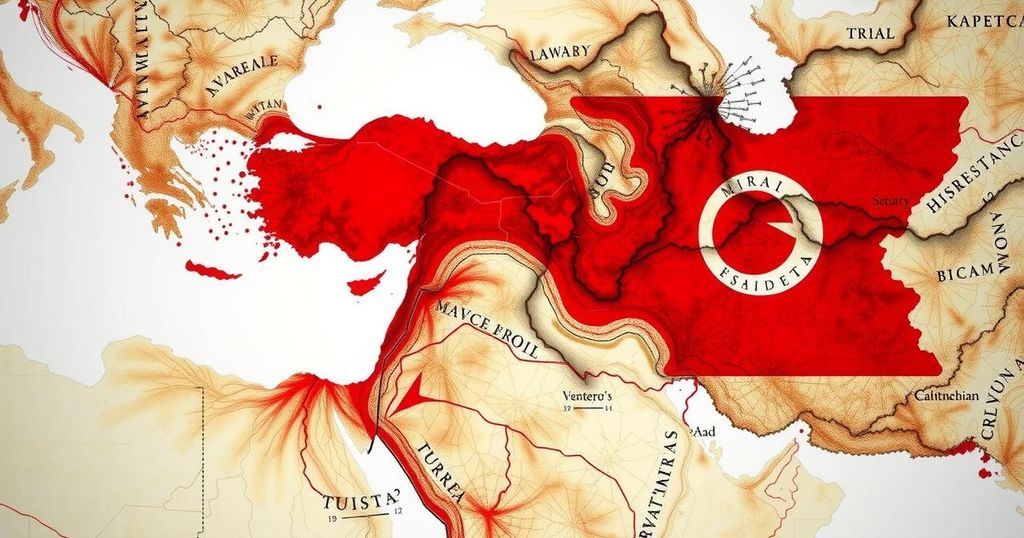World news
ABBAS ARAGHCHI, AL JAZEERA, ASIA, ASSAD, BASHAR AL - ASSAD, CONFLICT, EUROPE, EUROPE/ASIA, FIGHTER JETS, FOREIGN POLICY, HAYAT TAHRIR AL - SHAM, HTS, IRAN, JAMES BAYS, RUSSIA, SERGEI LAVROV, SYRIA, SYRIAN CIVIL WAR, SYRIAN CONFLICT, TURKEY, UKRAINE, UN SECURITY COUNCIL, WAR
David O'Sullivan
0 Comments
The Fall of Damascus: Shifting Power Dynamics in Syria
The article discusses the swift diplomatic failure of Russia and Iran following Bashar al-Assad’s fall from power, emphasizing the emergence of Turkey as a dominant force in the region. Russian and Iranian diplomats convened to discuss Syria’s future, but were rendered irrelevant as events rapidly unfolded. The Turkish foreign minister is poised to help establish a new governance structure in the wake of Assad’s departure.
In the wake of significant developments in Syria, the anticipated control of key diplomatic figures from Russia and Iran quickly faltered, underscoring the swift dynamics of power in the region. Just hours after these representatives convened with their Turkish counterpart and some Arab nations in Doha to assert the necessity of ceasing military hostilities and safeguarding Syria’s territorial integrity, they were blindsided by the fall of President Bashar al-Assad. This rapid shift rendered the diplomatic efforts of the meeting ineffectual, highlighting the tragic unpredictability of geopolitical maneuvers.
The discussions prior to Assad’s demise, characterized by an evident sense of unease, revolved around the fragile condition of his presidency. Assignments from Russian diplomats indicating Assad’s obstinacy in recognizing the reality of his political situation seemed increasingly futile. As events unfolded beyond the control of Moscow and Tehran, it became evident that their influence might erode significantly in Syria, leading to uncomfortable reflections for Russian Foreign Minister Sergei Lavrov, as he faced inquiries regarding Russia’s sustained involvement.
Lavrov, unable to assert a confident stance regarding Syria’s future, became increasingly defensive when challenged about Russia’s decade-long commitment. In a moment of exasperation, he remarked, “If you want me to say: ‘yes we lost in Syria, we are so desperate,’ if this is what you need, let’s continue.” His reluctance to confront the failures of his government in Syria contrasted sharply with his greater ease in discussing Russia’s military operations in Ukraine.
Iran’s Foreign Minister Abbas Araghchi, in a state of visible distress, attempted to maintain the narrative of a feasible path for Assad’s survival, despite overwhelming evidence to the contrary. The Iranian strategy of a strong foothold in Syria faced existential threats, as Tehran struggled to maintain its regional influence following substantial military setbacks. In stark contrast, Turkish officials, represented by Foreign Minister Hakan Fidan, appeared poised to capitalize on the emerging vacuum of power, indicating that Ankara could facilitate a new political framework among Syrian factions.
As the dust settled from Assad’s sudden downfall, Russia and Iran found themselves on the precipice of diminished relevance within Syria, while Turkey’s role emerged as increasingly significant. The interplay of regional powers in the wake of this crisis delineates an evolving landscape of influence and governance in Syria, with Turkey potentially taking the lead in shaping the future of the nation.
The context of this analysis revolves around the recent fall of Bashar al-Assad, highlighting the diminished roles of traditional powers like Russia and Iran in Syria. As the Syrian conflict persisted for over a decade, major external actors had consistently been involved in diplomatic efforts aimed at stabilizing the region. However, the rapid developments suggest a shift in power dynamics, particularly favoring Turkey, which now stands at the forefront of shaping Syria’s political landscape in a post-Assad scenario. The failure of earlier negotiations underscores the fragility of diplomatic relations among these significant players who have historically supported diverse factions in the Syrian crisis.
The swift fall of Assad has dramatically shifted the geopolitical landscape of Syria, diminishing Russia’s and Iran’s influence while elevating Turkey’s potential role in stabilizing and governing the fragmented nation. Despite earlier diplomatic efforts to consolidate power and authority, the current situation underlines the unpredictability of wartime alliances and outcomes. It remains to be seen how Turkey will manage the development of a new governance structure among the diverse Syrian factions while navigating the historical complexities that have defined this prolonged conflict.
Original Source: www.theguardian.com




Post Comment